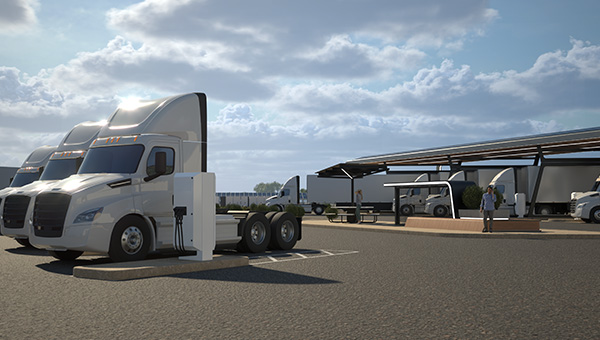Uber Freight and Greenlane Team Up to Accelerate the Development and Installation of Commercial Electric Truck Charging Stations
Greenlane has announced it will build its first charging corridors in Southern California, followed by the Texas Triangle and northeastern United State
Uber Freight, a leading enterprise technology company powering intelligent logistics, and public electric commercial truck charging network service provider Greenlane, a $650 million joint venture between Daimler Truck North America, NextEra Energy Resources, LLC and BlackRock (through a fund managed by its Climate Infrastructure business), today announced a collaboration aiming to accelerate the development and installation of public charging infrastructure for Heavy Duty Battery Electric Vehicles (HD BEVs). This strategic collaboration will, in turn, accelerate the adoption and deployment of HD BEVs at scale and represents a critical step in determining how HD BEVs can operate and distribute goods as efficiently and cost effectively as possible.
Through this collaboration, Greenlane will leverage insights from Uber Freight’s logistics network, representing $18 billion in active Freight Under Management, to unlock critical learnings regarding the future development and installation of public charging stations on highways in North America. Uber Freight’s vast network data will augment Greenlane’s own data analysis to determine corridors that are prime candidates for early HD BEV deployment, charging infrastructure needs, and the addressability of shipping lanes for electrification. The two organizations will also explore leveraging Uber Freight’s marketplace technology to potentially create in-application charging appointment scheduling, surface Greenlane charging stations, fuel card discounts, and more directly to carriers.
“I am delighted that we will be working with Uber Freight to accelerate BEV adoption and help reduce the carbon footprint of freight distribution,” said Patrick Macdonald-King, CEO of Greenlane. “Our national network of EV charging and hydrogen fueling stations together with our Uber Freight collaboration will make the electrification transition easier for shippers. Together, we will pave the way for a greener and more efficient future in logistics.”
“Electric trucks present a tremendous opportunity to help decarbonize supply chains and significantly reduce global emissions,” said Lior Ron, CEO of Uber Freight. “We are thrilled to work with Greenlane on this initiative, as this collaboration exemplifies our commitment to reducing the impact of logistics on the environment and further establishes Uber Freight as a leading logistics network choice for customers looking to adopt and deploy electric trucks.”
In a recent survey conducted by Uber Freight and FreightWaves, 13% of U.S. shippers indicated that they are currently utilizing electric trucks, while 77% indicated that they are either considering them today or in the future. Moreover, Uber Freight found that shippers are willing to pay an extra $90 per load for green transportation using electric trucks or other renewable fuels.
Even so, a lack of publicly available, nationwide electric charging infrastructure for commercial vehicles persists as a barrier to increased HD BEV deployment by fleets. By combining Uber Freight’s network insights with Greenlane’s goal to build a nationwide charging network for commercial vehicles, the organizations enhance the ability to build public charging stations where they are most needed, which means fleets can confidently begin their transition towards zero emissions. Ultimately, this initiative helps the freight industry accelerate HD BEV adoption by addressing the unique challenges of sustainable logistics.
Greenlane has announced it will build its first charging corridors in Southern California, followed by the Texas Triangle and northeastern United States. In support, Uber Freight is unveiling a new whitepaper that exemplifies the types of data-driven insights Greenlane will consider as it explores where, and when, to install its charging and hydrogen fueling stations. Uber Freight utilized its own network data to better understand where charging stations are needed to meaningfully enable the deployment of HD BEVs and address sustainability challenges within the freight industry. Included in this analysis are findings regarding lane and region prioritization, facility enhancement recommendations for shippers, and more. Click here to download the research.
Category: Electric Vehicles, Equipment, Featured, Fuel & Oil, General Update, Green, News, Safety, Shop Stuff, Tech Talk, Transit News











